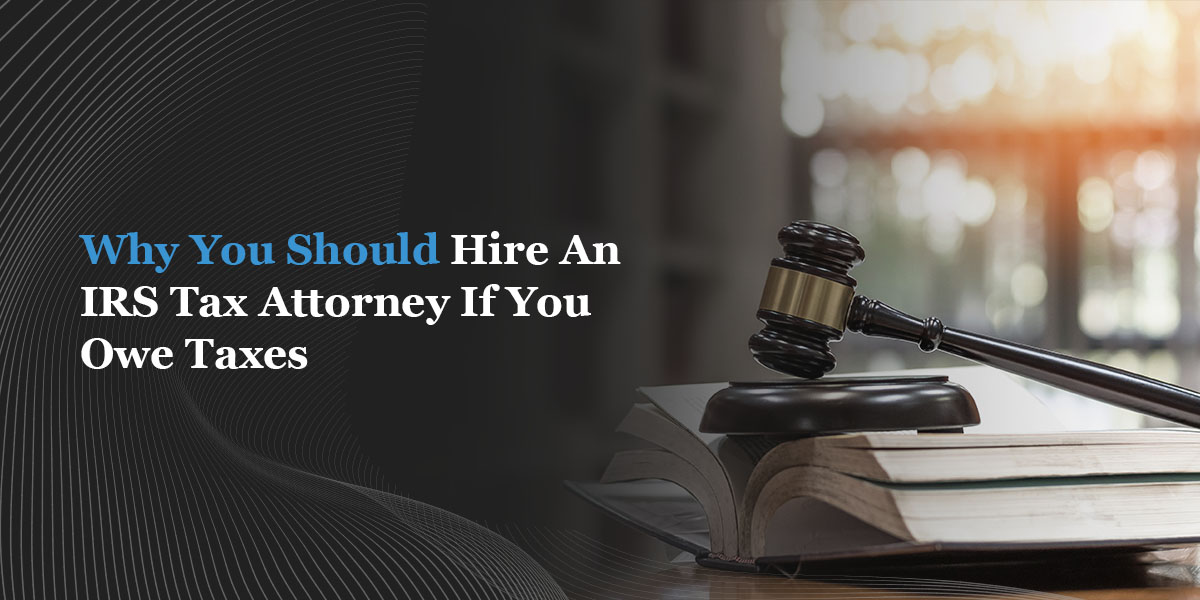
100+ Years of Combined Tax Resolution Experience.
100+ Years of Combined Tax Resolution Experience.
Owing taxes can be a tricky situation and dealing with the IRS can be scary and intimidating. Just like you wouldn’t try to get a settlement for a car accident alone, you shouldn’t try to resolve your tax problems alone. An IRS tax attorney can both communicate on your behalf with the IRS and help find tax payment solutions that work best for you and your situation.
Table of Contents
Who Should I Get IRS Tax Help From?
If you are looking to get IRS tax help, you should look at getting a qualified IRS tax attorney. An IRS tax lawyer is familiar with the tax laws and can represent you in Tax Court if you have to go there. If you hire a tax attorney, they will do the arguing and negotiating for you. They can help explain all the IRS tax relief solutions that you qualify for and what that would mean for you.
A tax lawyer will also advocate and negotiate on your behalf with the IRS. They can help argue for tax deductions or other tax items and help you stay out of tax trouble in the future by ensuring you file your taxes correctly and pay your owed taxes on time and efficiently. If you need help filing your tax return, find a good tax preparer. If you aren’t sure how to file or what tax credits you will qualify for, both a tax attorney and a tax preparer can help you find the right ones.
At Polston Tax, we offer advanced tax services to help you with accounting, unpaid tax resolutions and tax preparation. If you need tax help, reach out to us today.
When to Hire a Tax Attorney
As a taxpayer, you may find yourself in a situation that could be resolved with the help of a tax attorney. Alternatively, maybe you want to be proactive and hire a tax attorney to help you with your taxes so you don’t face any conflicts with the IRS. The following are a few situations when it may be beneficial to hire a tax attorney:
- You want to remove a tax lien or levy.
- You have been notified about a tax audit.
- You have major assets or high tax liability.
- You want to pursue an Offer in Compromise.
- You’re facing tax fraud or tax evasion charges.
- You’re self-employed and need help navigating self-employment taxes.
- You’ve made attempts to correct a tax-related mistake, but the IRS is ignoring your efforts.
Tackling these situations on your own can be overwhelming, difficult and may not lead to your desired results. A tax attorney has the experience and knowledge to help you navigate whatever tax issue you’re facing and reach the resolution you’re seeking. At Polston Tax, we’ve been helping our clients escape the nightmare of unpaid taxes since 2001. Reach out to us today to learn more about how we can provide the tax help you need.
What Should I Look For in a Tax Attorney?
It may seem easy to hire a tax attorney, but it’s important to know what to look for when hiring one, including specialty, accounting background, services and open communication.
Experience and Specialty
First, make sure they are in fact a tax attorney. Yes, any type of attorney can represent you, but a qualified tax attorney will have the experience and knowledge you need to resolve your tax issue efficiently. Just like you wouldn’t go to a heart surgeon for brain surgery, you shouldn’t go to a divorce lawyer for tax help. Sure, they could give you advice, but if they don’t have personal experience dealing with IRS tax problems, chances are you’ll be paying for advice that won’t really help you.
Accounting Background
When looking at hiring an IRS tax lawyer, you should ask each potential tax lawyer a few questions to see if they are qualified. One thing to ask any potential tax attorney is if they were also previously an accountant.
Several tax attorneys have experience as accountants, and therefore, have a better understanding of how your financials work and will use that to their advantage when negotiating with the IRS. This gives you and your tax attorney a leg up because they will have a better understanding of what your financial situation looks like and what it should look like.
At Polston Tax Resolution & Accounting, our team consists of more than 100 attorneys, accountants, CPAs, tax preparers and case managers who can get you the tax and accounting help you need and ensure business finances are compliant and personal taxes are accurate. Learn more about our accounting services today.
Offered Services
Another thing to ask a potential tax attorney is how far that tax attorney will take your case. Some tax attorneys will just file the proper paperwork for your IRS resolution but will not negotiate with the IRS on your behalf or won’t go through the appeals process with you if your tax resolution is denied. This is important, as almost always when trying to get a resolution, the IRS will ask for substantiation or more information about certain items.
The IRS may also deny part of the resolution or want to increase the amount you pay. If your tax attorney is not going to go to these lengths for you, then you will probably not get an affordable resolution and still have unpaid taxes. Some tax lawyers won’t help with releasing bank levies or wage garnishments, so if you have one or fear you may receive one, ask about those too.
When discussing your case with your tax attorney, ask them each step they will take and what will happen if you are denied or if you need to appeal. Make sure you get it in writing if they are promising that they will work on your case until they reach an agreement for you. Most tax attorneys will have you sign an engagement letter or some type of agreement outlining what they will do for you.
Some attorneys may have additional costs for the appeals process or adding in additional tax years that you owe taxes on. This is normal, but make sure these costs are written out in your letter and you understand why those additional charges may occur.
Polston Tax offers a wide range of tax resolution and accounting services to help you deal with taxation-related issues, including appeals, bank levies, audit representation, advanced tax planning and tax return preparation.
Open Communication and Customer Service
Most importantly, find a trustworthy, communicative IRS tax attorney. With so many moving parts, it is easy to get lost or confused when you are trying to resolve your tax problem. Make sure you and your attorney have set reliable expectations and that you always communicate with each other. When the unexpected occurs, having an open line of communication is essential.
Hire an IRS Tax Attorney From Polston Tax
Looking for an IRS tax Attorney near you? Good news — Polston Tax can help. Our team of tax lawyers and tax consultants work with clients across the country to resolve their IRS issues. This can include tax debt help, releasing bank levies, help with wage garnishments, removing liens or helping a client qualify for an Offer in Compromise. Our team can’t wait to help you end your tax problem today! Call us at 844-841-9857 or contact us at Polston Tax to schedule a free consultation.
Additional Readings

We’re in an era in which more small businesses are launching like wildfire. Many people find starting a small business of their own as easy as a piece of cake. However, most of the time, what they fail to prioritize are some of the major players involved in smoothly operating their small business. A...

Do you know why most married taxpayers go for filing joint tax returns? It’s actually because of the benefits that it offers. But with joint tax returns, both the filers hold the responsibility for the tax bill or any penalties and interest that arise from it. Both are legally responsible for the entire liability, even...

What if you owe so much in taxes that you can’t see your way out of it? If you owe back taxes, you might not think there is a way you can ever pay things off. And the more those back taxes have accumulated, the deeper the hole. But that doesn’t mean you can’t dig...

Tax Audits are one of the most terrifying things a taxpayer can endure. Most taxpayers don’t know what being audited by the IRS entails and usually don’t know what to do if they are audited. IRS audits can be confusing to most taxpayers as most don’t know what the IRS is looking for when they...

Receiving a letter from the IRS can be intimidating, especially if you’re unsure what the notice is for or what to do next. Fortunately, many notices are nothing to worry about and are purely informative. Below, we look at everything you need to do — and what not to do — after getting a notice from the...

The Internal Revenue Service (IRS) is increasing audits on cannabis businesses — the agency is on a mission to ensure that cannabis businesses adhere to the tax code. Unfortunately, cannabis companies must comply with more strict tax laws than other businesses and can claim fewer deductions. Most business owners don’t realize this or aren’t able to meet the reporting responsibilities on their own. If you own a business in...


